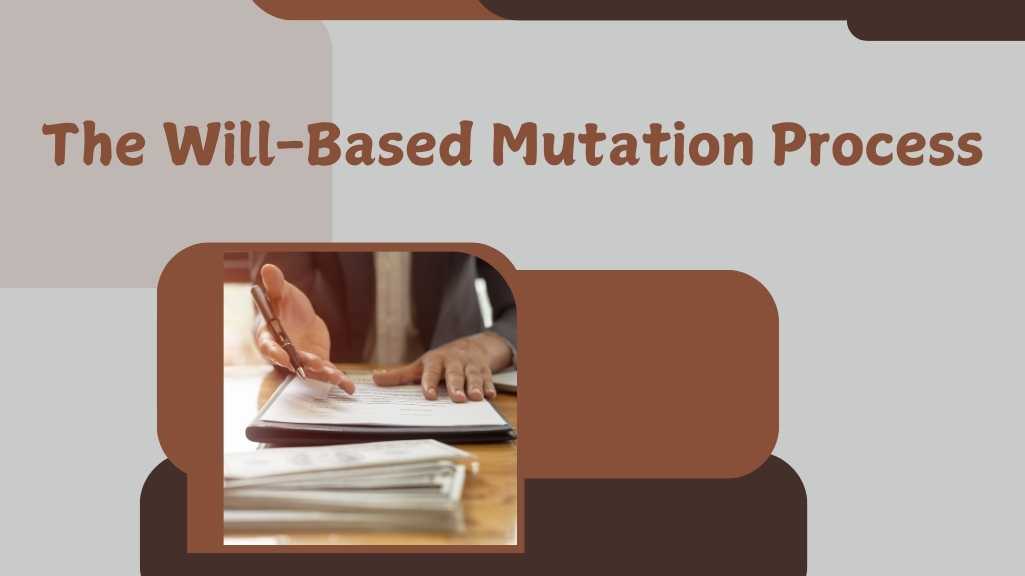In Pakistan, the relationship between property ownership and personal accumulation is rarely a simple one. The transfer of ownership becomes an issue when a property owner dies, especially if they have left behind a will. This is known as probate, the legal process of having ownership rights to property pass along in accordance with how a deceased persons will name those beneficiaries. This article will explore the history of will-based mutation, its role in governance, and how it functions in contemporary Pakistan, together with some changing reforms happening lately like digitalization that revolutionized this important process.
Table of Contents
What is Will-Based Mutation?
Will-based mutation: It happens when property is transferred according to the will (وصیت) of a deceased person, it’s basically about legal procedure. After the death of a property owner (testator), his/her will is submitted to state authorities and this process ensures that assets are divided according to recognition as legal heirs.
This process of mutation in the revenue records is necessary to update official land records and have the new owner’s name recorded legally. If a will-based mutation is not put through, the house continues to be under the name of that deceased person and it often results in legal issues or becomes difficult for reselling or managing heritance.

Key Points:
- Legal Transfer: Transfers the Ownership of The Property Legally According to Will.
- Avoid Disputes: Reduces the chance of a family dispute over inheritance.
- Financial importance: it helps in securing loans or selling the property in the future.
Will-based mutation is Important for Property Transactions
The will-based mutation process is essential but can be challenging in Pakistan:
1. Legal Ownership
A will-based mutation legally verifies that the deceased person’s assets now belong to a new owner. It is important in order to avoid property disputes and make the land saleable, transact-able or can be used as collateral for taking a loan.
2. Avoidance of Disputes
Improper mutation would not ascertain clear ownership of your property and can cause disputes between your heirs or the others claiming it. Inheritance: Mutation ensures that the actual beneficiaries named in the will inherit property without any confusion.
3. Government Records Update
Mutation is the process of updating official land records. It’s the process of establishing record keeping for life be it because lawyers have to, or municipalities need a sound means of going about with property taxation. By updating records, the government is enabled to correctly assess property values and collect taxes.
4. Access to Financial Services
Buying property Banks and financial institutions require current ownership records to approve loans or mortgages. Mutation-Without mutation, even biological heirs cannot prove legal ownership of the property which is necessary to secure any kind of financial assistance.
History of Will-Based Mutation in Pakistan
The system of mutation in Pakistan is old back to the colonial land administration regime which was established during British period. The British introduced a land revenue system in the pre-independence era to govern and control property rights, tenancy & tax. This system was adopted and became the basis of land management after independence in 1947.
In the past, it was common to control mutation processes by hand which significantly reduced conclusion times and made room for mistakes. In the recent past, reforms such as…. have been initiated by government to facilitate mutation process more transparent and efficient aimed at digitalizing land records.
The Will-Based Mutation Process: A practical Guide
Beneficiaries must accomplish the following specific tasks in order to effectuate property transfer based on a will:

1. Application for mutation Submission
The beneficiary or heir is required to file a mutation application at the local revenue office (commonly known as Patwari) once testator has passed away. The application require the following:
- A copy of the will
- The deceased death certificate
- CNIC copies of the heirs
- Fard Malkiat or land ownership document
2. Verification of Documents
Patwari, the revenue officer will authenticate your documents. This will ensure that the Will is valid under law and to reiterate what assets are owned by whom. The will is must be made in accordance with the inheritance laws of Pakistan and should confirm to make it as a valid for mutation.
3. Public Notice
The local revenue office shall promptly publish the Mutation Application, after receipt of such an application. This step is necessary so that any alleged claims or objections to this inheritance if they exist, can be made by the claimants concerned.
4.Resolution of Objections
At any time, at the request of a competitor or randomly discovered objection to an HBL application resources can be used that dig into a database and through A.I. present all sides in one transparent report for resolution.
If dissent is acceptable, it can be taken to a court. Nothing else will change until all those objections are ironed out and resolved.
5. Issuance of Mutation Order
Once all cases are verified, the Tehsildar or revenue officer passes a mutation order. This command, in practice permits the ownership of a property to move from one person to another.
6. Record Update
Update of Land Record (Jamabandi or Fard)- after this last step is completed. Instead, the beneficiary receives a copy of title where they can simply change out the deceased and put in the new owner’s name.
Digitalization in Will-Based Mutation
Pakistan has been making huge strides to digitize the land records and facilitate mutations in recent years. It does so by decentralizing property transactions and in turn adding transparency, efficiency across the board wherever it is implemented.
1. Punjab Land Record Authority
Punjab is the pioneer in digitizing land records by initiating establishment of Punjab Land Record Authority from 2017. A. The PLRA has created a web-based system where any person can:
- Check land ownership details.
- Apply for mutations.
- Monitor the state of their requests on the online.
The digital platform minimizes the use of manual processes, which in many cases were sluggish and prone to corruption or mistake.
2. Digital Reforms in Other Provinces
After the success of Punjab, other provinces such as Sindh and Khyber Pakhtunkhwa have also begun to use digital land record systems. And recently, the Sindh Board of Revenue and Khyber Pakhtunkhwa Revenue Department took similar measures to reform land administration.
3. Benefits of Digitalization
- Transparency: With digital records, property transaction record is less prone to tampering or fraud.
- Efficiency: Digital Systems Serves for Efficiency in the Mutual Specifications and Record Updating.
- Ease of Application: Beneficiaries can apply for mutations and track the progress online, this way time is saved with fewer visits in person to revenue offices.
4. Challenges of Digitalization
However, few challenges still need to be overcome specifically in rural areas where internet penetration is meager and digital literacy being minimal. At the same time, government officials must be trained continuously to accommodate new digital systems effectively.
Recent Amendments on Will-based Mutation Process
Government of Pakistan has taken following major steps to enhance the will-based mutation process:
1. Faster Processing Times
Manually, the process of mutation could take weeks or even months earlier. The ultimate goal of recent reforms is to shorten processing times significantly, with 30 days or less should be enough for one property transfer and reducing delays.
2. Online Application Systems
Some provinces now also provide online services for applying mutations. This eliminates the requirement of physical visits to revenue offices and thereby saving time & making it more customer-friendly.
3. Anti-Corruption Measures
Digitalization is one of the most important objectives to be pursued and it will prevent significantly opportunities for corruption. The mutation process will be corruption and favoritism-free. Online tracking: With the virtual platform all mutations executed using online ATPS services are tracked centrally, enabling authorities to stop unauthenticated entries. By minimizing human intervention in this field by increasing transparency & accountability.
Conclusion: The Relevance of Will-Based Mutation in Contemporary Pakistan
Testamentary mutation is an essential part of making sure one’s property passed to those who are legally same with the aim, in accordance with said deceased. And with the digitalization of land records and recent reforms, signing a mutation document has become more transparent, faster and easier to understand. But obstacles remain, too like inadequate internet availability and low digital literacy in rural areas.
Then you need to know about will-based mutation process when dealing in property inheritance in Pakistan for the purpose of legality and checking back future disputes. As modernization efforts continue, the mutation process is slated to get easier and more reliable in years to come.
Answers To Frequently Asked Questions About the Will Based Mutation
1. What is Will-Based Mutation?
Mutation based on wills is mutation process in which the deceased person decides who his heirs are in land inheritance legally by transferring property outright to them.
2. What is the need of Will-Based Mutation?
This is crucial because it legally finalizes a real estate transaction, updates government records for the property and can help prevent disputes while allowing someone else to use land as collateral.
3. Eligibility for Will-Based Mutation? Can I Apply
In the case of a will-based mutation, you have to apply for Mutation along with Will (original) Death Certificate & related papers in local revenue office. You can also apply online in some provinces.
4. Digitalizing the Mutation Process: What are We in for?
The process of mutation has become more transparent, efficient and reachable with this digitalization. The application which is now available online for the beneficiaries enables them to check their status of the applications without having to visit revenue offices.
5. What Are the Remaining Challenges of Mutation?
In addition, not all rural areas have access to the internet and government staff continue to need training on digital systems.

